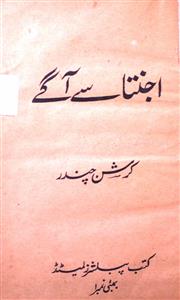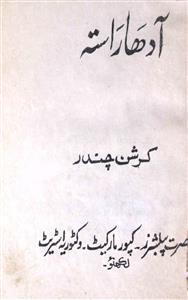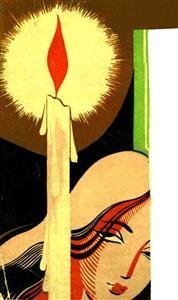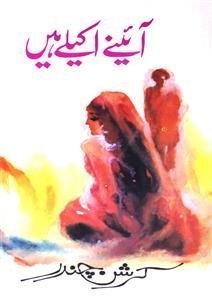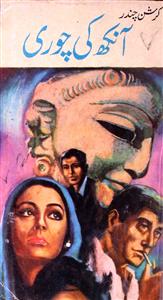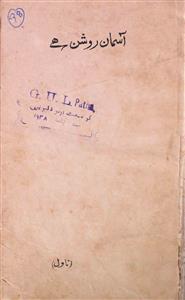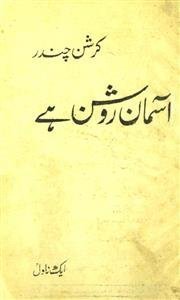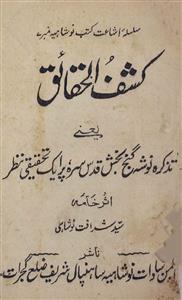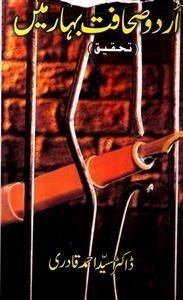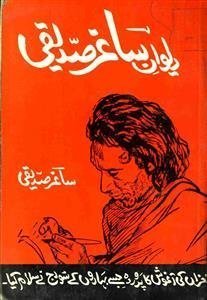 For any query/comment related to this ebook, please contact us at haidar.ali@rekhta.org
For any query/comment related to this ebook, please contact us at haidar.ali@rekhta.org
About The Book
کرشن چندر کا شمار اردو کے صف اول کے تخلیق کاروں میں ہوتا ہے۔ انہوں نے اردو نثر کی تقریباً ہر صنف کو وسیلۂ اظہار بنایا ہے، جیسے افسانہ، ناول، انشائیہ، طنز و مزاح، تنقیدی مضامین، خطبات، ڈرامہ، رپورتاژ، تمثیل اور شخصی خاکہ۔ زیر نظر کتاب "اجنتا کے آگے" کرشن چندر کا افسانوی مجموعہ ہے۔ اس مجموعہ میں ان کے دس افسانے شامل ہیں جس کی تفصیل یہ ہے۔ پورے چاند کی رات، خلل ہے دماغ کا، مغربی گھاٹ کی سیر، میرا بچہ، انجینئر، پھول سرخ ہیں، بت جاگتے ہیں، مرنے والے ساتھی کی مسکراہٹ، اجنتا سے آگے اور جانور جیسے افسانے شامل ہیں۔
About The Author
Krishn Chandar is the distinguished personality of Urdu fiction whose writings encompass diversity, delight, romance, reality, rebellion, humor, and satire; of all romantic realism is his unique attribute. Through his short-stories and novels, Krishan Chandra was at the forefront of the progressive writer’s movement and brought it to the world stage. He wrote dozens of novels and over 500 short-stories. His works have been translated into various languages of the world. It seemed as if he had the heart of a poet and the brush of a painter. His subjects revolved around the life of an Indian and its problems. He also experimented with the structure of his stories and laid the foundation of a new sub-form which was an amalgam of short-stories and sketches. And this new, distinct style gave Urdu fiction a new lease of life. Apart from novels and short-stories he also wrote sketches (Khaake), belle-letters (Insha), reviews (Tabsira), and reportages, all of whom have his distinct impression signed all over them.
Krishn Chandar was born on November 23, 1914, in Bharatpur, Rajasthan. His father, Gauri Shankar Chopra, was a medical officer who later worked in the Punch district, where Krishna Chandra’s childhood days were spent. He got his primary education in Mahender-Garh. He started studying Urdu from the fifth grade and took Persian as an optional subject in the eighth grade. Later, he enrolled in Forman Christian College, Lahore. At the same time, he met Bhagat Singh's associates and began to take part in revolutionary activities. He was arrested and detained for two months in Lahore Fort. When he failed in the FA, he ran away from home to Calcutta out of shame. But when he found out that his mother had fallen ill due to his disappearance, he returned and continued his education earnestly and did an MA in English and then LLB. He was interested in literature and he started writing for various magazines and became known in literary circles. Around this time, many of his short-story collections like ‘Khayaal’, ‘Nazzare’, and ‘Naghme Ki Maut’ had been published, which were well received. His first novel, ‘Shikast’, was published in 1943.
In 1966, Krishn Chandar was invited to the Soviet Union for 15 days as he was to be awarded the Soviet Land Nehru Award. He visited Russia with Salma Siddiqui where they were warmly welcomed. Young Russian boys and girls were acquainted with his writings through translations and were his admirers. In 1973, the Films Division decided to make a documentary on his life given his huge stature and universal personality, and this work was entrusted to his brother Mahender Nath. The film was shot in Bombay, Pune, and Kashmir. In 1969, he was awarded the Padma Bhushan. On May 31, 2017, the Postal Department issued a stamp of Rs. 10 in his memory.
Krishn Chandar was a heart patient. He had heart attacks in 1967, 1969, and 1976 but survived. On March 5, 1977, he had another heart attack, and following it he died on March 8. There is no one more successful fiction writer than Krishna Chandra in terms of the number of readers. The amalgam of romance and reality found in his writings is in keeping with the essential quiddity of Indians. It is a fact that Indian nature is imaginative and romantic, but the demands of time and circumstances have also made them realistic. Krishna Chandra's works fulfill both these demands. He does not forget collectivity along with his individuality. When he speaks, one feels as if he is talking about society as a whole. His success lies in his rich life-experiences of the past. His open-heartedness and astuteness have appreciatively enriched Urdu literature.
 For any query/comment related to this ebook, please contact us at haidar.ali@rekhta.org
For any query/comment related to this ebook, please contact us at haidar.ali@rekhta.org
